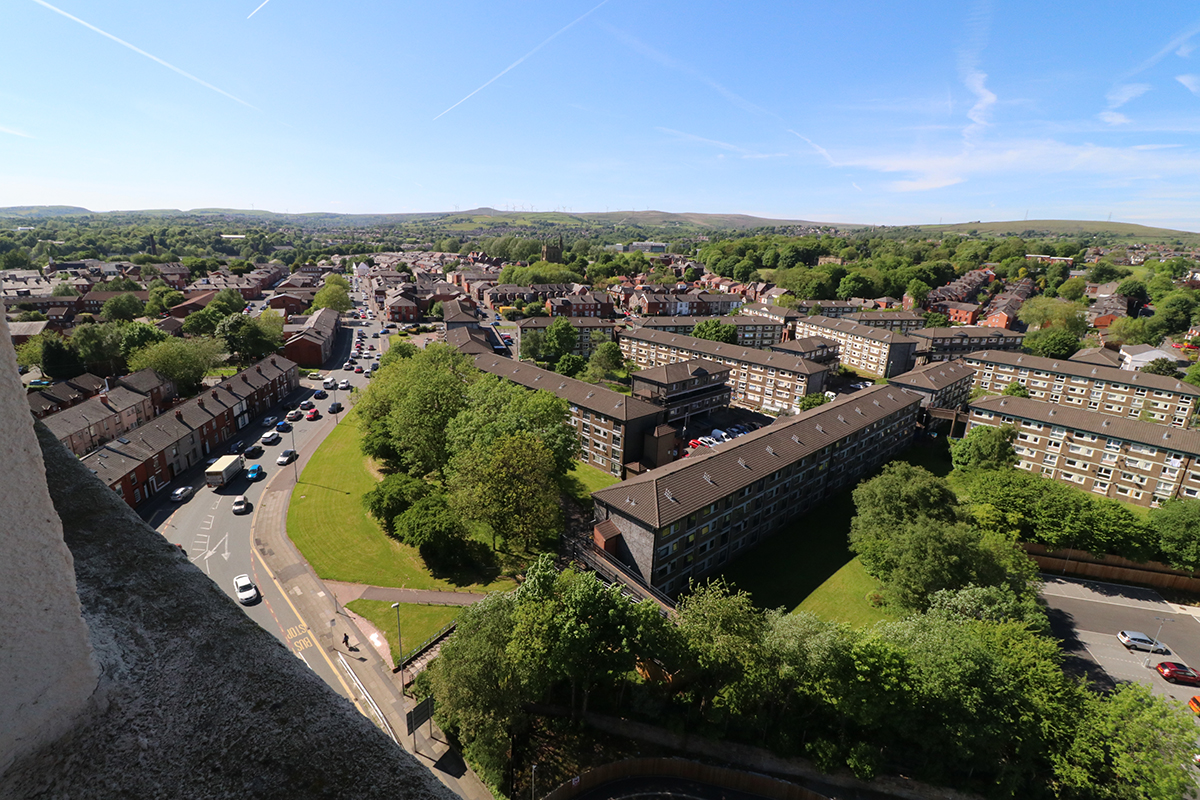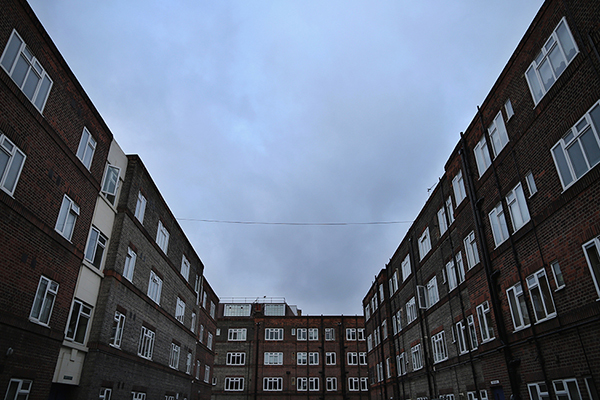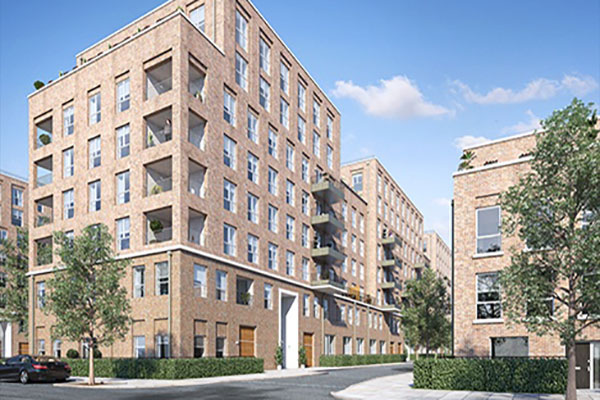You are viewing 1 of your 1 free articles
Rebuilding Soapsud Island
The South Acton Estate is getting a makeover. After years of decline, Gavriel Hollander finds how it will look in the future and what it will mean for residents
A decade ago, Acton Gardens did not exist. When one of the country’s biggest regeneration projects finally ends here, in 2024, it will be home to more than 5,000 people. But until recently, what is currently a huge sprawling patch of 1960s and ’70s tower blocks and maze-like mid-rise terraces was known by very different names.
“It was always just the South Acton Estate,” remembers Dave Fox, president of the South Acton Working Men’s Club. “That or Soapsud Island.”
The alternative moniker is a reference to what was once a thriving local laundry industry, serving the boom in the late Victorian laboring market and fed by waters from nearby Bollo Brook.
“They’ll probably sell it as spring water now,” laughs Mr Fox.
It’s a joke, of course, but there’s a reason it resonates with the other club members, sipping their pints on a bitter late February evening. That’s because rebranding – as much as regeneration – is at the heart of what is going on in this quiet, almost suburban corner of west London.
“They” in this instance are L&Q and property developer Countryside. Together, they rechristened the area Acton Gardens when they were appointed to take on the bulk of the estate’s regeneration work in 2010. This followed the completion of 346 homes by Catalyst Housing Group and the abandonment of a Wates-led private sale scheme.
Time for a rebrand
And it’s not hard to understand why the area needed a rebrand. South Acton had earned a reputation as one of London’s most difficult estates, with poor design often cited as contributing to a high level of crime. Social problems, including drug dealing, were rife and a number of buildings were falling into disrepair. It is widely accepted that the area had been ripe for a fresh start for some time.
But it is in the nature of regeneration that you can’t please all of the people all of the time. Indeed, the bigger the project, the harder that particular obstacle becomes, and projects don’t come much bigger than this one.
Inside Housing visits South Acton to find out more about the plans to drag the estate into the 21st century and take the local temperature as the project approaches its mid-point.
South Acton is Ealing’s biggest and best-known estate. It was even used as a body double for Del Boy and Rodney’s Peckham council flat on Only Fools and Horses. But change has been in the air for some time.
“When we started this process, everyone was clambering to get out,” says Pat Hayes, executive director for regeneration and housing at Ealing Council, recalling a process that began with a review of all of the borough’s estates in 2007. “South Acton came out as the top priority.”
“If they take our flats they should give us the whole flat, not a part of it.”
Yacob, tenant
Over more than 20 phases, spanning 14 years, a total of 2,853 new homes will be built here, replacing the 1,800 that made up the old estate. Physically, the area will be almost unrecognisable, with high-rise towers and elevated walkways giving way to street-level entrances and more open public spaces.
Almost half of the new homes have been designated as affordable, with 954 (33%) available at affordable rent. Alongside these are nearly 1,500 homes for private sale, and it is this injection of new blood that could most drastically alter the social landscape of the site.
“What we have done is make it feel like the rest of the surrounding area, which is a much more mixed community,” explains Mr Hayes, when asked about the change in demographic that the growth in private sale units is likely to bring. “It will integrate the estate into the rest of the area, both physically and socially.”
Indeed, the design of the new iteration of the estate has won praise beyond the confines of west London. In the government’s December 2016 Estate Regeneration National Strategy paper, the work being done at South Acton was singled out as an exemplar of placemaking and regeneration.
Of course, winning praise in Whitehall does not mean that everyone is happy about what is going on in their own backyard. The arguments around how best to take on the challenge of breathing life into failing estates are well worn and repeated in major cities across the country. How do you squeeze value out to reinvest in housing? How do you retain a sense of community? How do you convince residents to endure months or years of disruption?
These are all questions that are being faced up to in South Acton. What is different here is that the developers are doing more than usual to find out exactly what residents think of what’s going on.
A condemned block on the South Acton Estate
Countryside and L&Q have commissioned an independent report by the University of Reading and social enterprise Social Life to examine the impact on residents of the development and the sustainability of the project. The report, which will be revisited every two or three years until work on the estate is complete, is no whitewash: one of its main jobs is to identify things that will need work before the community accepts the changes being pressed on it.
In interviews with residents (see box), the report highlights their concerns. These include worries that the character of the estate would change and uncertainty about the options they have in terms of accessing the new housing. But those who commissioned the report are not perturbed by any negative findings.
“What has come out of the study quite clearly is that people are concerned about the local community,” says Mark Ludlow, a development director at Countryside who leads on the Acton Gardens project. “A lot of people have been living here a long time and have built up relationships.
“These are people’s lives we are dealing with [so] we have to go on repeating our message and hearing people’s concerns. If you don’t do that, you will get the myths being generated and the slanging matches at meetings.”
Right to stay
A critical part of the deal for residents is that everyone who wants to stay can do so. There will be more affordable rent properties on the new estate than there were social rent in the buildings being knocked down, meaning everyone living in a council-owned flat at the moment can move into one with a housing association landlord, once built.
“What has come out of the study quite clearly is that people are concerned about the local community.”
Mark Ludlow, development director, Countryside
Some are yet to be convinced the deal is as good as it seems, however. John Gashion, a resident on the estate for 40 years and vice-chair of the South Acton Residents Action Group, claims that not everyone has been guaranteed a home post-redevelopment.
“Before this started they said the residents could stay on the estate,” he tells Inside Housing. “Now some are being told to bid on Locata [Ealing Council’s housing options site] to get somewhere else in the borough.”
Mr Gashion is also concerned that overall housing costs could increase by as much as 40% as a result of potential changes to council tax, service charges and water rates.
Ealing Council and the developers insist that every tenant has been given an opportunity to stay on the estate and Inside Housing has found no evidence that this isn’t the case, despite Mr Gashion’s claim. However, the very fact that any tenants believe this to be true demonstrates that the battle to win over hearts and minds is not yet won.
Furthermore, on the question of whether costs might go up, the picture is less clear. In a statement, L&Q says that it is charging target rents on the already completed phases one to three, while from phase four onwards, the social rent units will be set according to the mayor’s office’s London affordable rent. Although this is designed to be a fairer system, it does not guarantee against rent increases for Acton Gardens.
Mr Hayes says the council is “very comfortable with” the basis on which rents will be set by L&Q as “they are a registered housing association”.
What the new estate will look like
For leaseholders, the deal is more complicated. They will be able to invest the value of their current home into a share of equity in a new one, with no rent charged on the portion retained by L&Q. There will be service charges on the new flats but the developers insist leaseholders are getting a bargain.
“I appreciate people’s concern about going from owning a whole place to shared ownership, but they are getting a modern new build property at no cost to themselves,” says Mr Ludlow.
Not everyone agrees. Yacob, a father of two girls who live with him in a flat in the southern part of the estate, bought his property 10 years ago for £135,000. He is unhappy about the prospect of losing his status as a homeowner.
“We have our homes and somebody wants to take them,” he tells Inside Housing.
“If they take our flats they should give us a whole flat, not a part of it. Whatever price they give us, we will not be able to find a house in London. The market price should be one that enables us to buy another flat.”
Yacob also claims that the valuation he gets will be lower than the market rate for the area, partly because the buildings have been “allowed to run down”.
Negotiating preferred
However, both developers and the council stress that valuations are independent and that residents are free to get their own assessments. Although compulsory purchase orders are an option, Mr Hayes insists they have been used sparingly. “We prefer to go down the negotiation route,” adds Mr Ludlow. “So far that has been successful.”
Back at the working men’s club, there is anger that no replacement facility has been found on the estate, meaning a 144-year-old institution is facing an uncertain future. Ealing Council has not granted a licence on the new estate. Mr Ludlow says the developers are consulting on finding a new home for the club offsite, but admits “it’s a difficult one”. Mr Hayes puts it down to a “change in demographics” in the area, with declining membership numbers baring that view out.
The club is an example of how difficult it is to satisfy the multitude of competing demands on a regeneration project of this scale. That said, other community groups are pleased with the new, greener, more open environment in which they’ll work.
It’s true that the atmosphere of Soapsud Island is changing as the shiny new buildings go up, but according to Mr Ludlow, that change is a positive one.
“We are never going to turn everybody around on day one,” he admits. “[But] I like to think we are influencing it for the better.”
Taking the pulse
Social Life and the University of Reading’s extensive survey of residents’ views on the regeneration of South Acton is an innovative approach to community engagement. Crucially, it will be revisited throughout the process to gauge how attitudes are shifting.
The headline findings from the first report suggest there are mixed feelings about the changes. Less than 40% of respondents said they felt “overall positive” about the regeneration.
However, only around 15% said they felt “overall negative”. The major concerns, identified through more than 500 interviews with residents, included the affordability of housing and maintaining community cohesion.
Countryside’s Mr Ludlow says he is happy to hear both the positive and negative feedback from the report. “We view it as a measure of how well we are doing and a good benchmarking experience,” he says.














